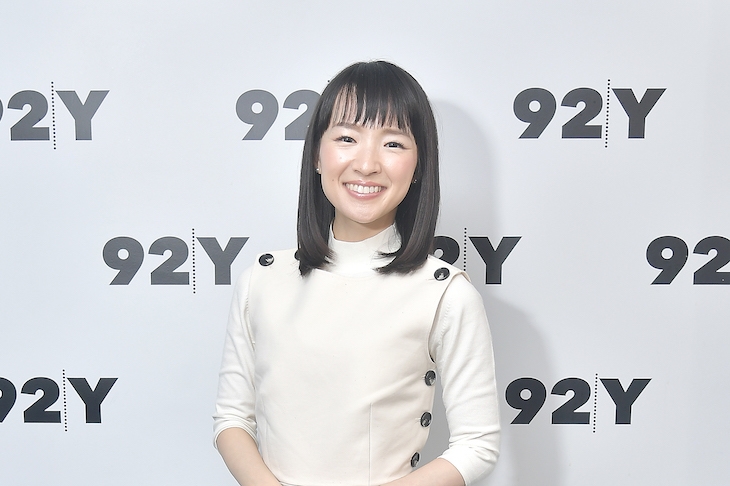If I’ve learned one thing in my twenty years in Japan it’s how to enter someone’s home. What you did is this: take off your shoes at the genkan (porch) and say the following, o jama shimasu (the nuisance is here). Under no circumstances should you copy the de-cluttering Goddess Marie Kondo, who in her new Netflix show begins her transformative mission to tidy an American couple’s junk filled house by kneeling on the floor, falling into a trance, and offering a solemn benediction to the soon to be de-cluttered home.
The petite but perfectly formed Marie, who looks as if she could be neatly folded and placed snugly on a shelf herself, has reached the zenith of subscription television in little over 15 years, since setting up her ‘organising consulting business’ as a 19-year-old student.
She began sorting out other people’s mess as a tidy minded schoolgirl (or annoying busybody – take your pick), volunteering to rearrange the bookshelves while her fellow students were out playing games. According to Marie, her spic-and-span inclinations assumed greater depth and refinement when she woke from a faint one day, and a God-like voice instructed her to ‘look more closely at things’ to identify what needed to be kept. Like Joan of Arc being told to rid France of the English, little Marie was commanded to clear all unnecessary items from Japan.
This epiphany, further influenced by five years’ work at a Shinto shrine, helped her develop a system of purging and preserving household objects that became known as the KonMari method. Best selling books, numerous YouTube videos, and a place on Time magazine’s 100 most influential people list followed. And now Netflix.
So what is the KonMari method? Well, apparently, we have all been tidying our houses wrongly. It should be done by category, not by room. And whether you keep or discard objects should be decided by cradling them; if they ‘spark joy’ they are reprieved, if not, they are ‘thanked for their service’ and chucked.
And that, along with some enhanced folding techniques, is about it.
But the procedures themselves are only part of the package. Marie arrives like a visitor from a simpler, deeper, more spiritual world, helping us rediscover essential values, long ago lost in our selfish materialism. KonMari de-clutters our minds as much as our homes.
Her UK popularity has been met with wry amusement in Japan, where people are surprised at the presentation of Marie Kondo as a star in her native land. In fact the de-cluttering boom ended here years ago, and though acolytes were spawned, many found the whole thing risible, overblown, and even un-Japanese.
The older generation, especially those with experience of postwar rationing, were particularly unimpressed. Japan has a deeply ingrained, and much older good housekeeping philosophy, in the concept of mottai nai (regret over waste). For seniors, throwing anything away, even if joy is longer sparked, is a heresy. The Japanese thing to do is donate it to the community, by leaving it outside on ‘gomi’ (rubbish) day for anyone to take.
Critics also pointed out that de-cluttering is less spiritual awakening and more practical necessity – Tokyoites have an average of 19.1 square metres of living space. I once enquired about what I thought was a reasonably priced one room apartment only to be told that the diagram I had seen was a parking space, and that it was an ‘easy mistake to make’.
Consequently, social interaction often takes place away from home, and Love Hotels are not only for illicit adulterers, but a respectable option for married couples seeking privacy. And keeping your room tidy is an essential life skill, not a mystical art.
Cultural historian Christopher Harding sees the KonMari phenomenon as the latest manifestation in a long series of ‘Japanese’ fads going back to the Meiji restoration (1866), which opened Japan to a flood of outside influences, and initiated in response a frantic rummage for anything vaguely marketable that could be classified as Japanese. The most enduring profitable discovery has been lifestyle.
There are now so many ‘The Japanese way of…’ books that the genre is becoming a little, well, cluttered. There’s even a compendium: ‘43 Japanese concepts to improve your life’, just released and timed, like Marie’s show, to catch us at our New Year’s resolution best. Writ large in kanji characters, the notions within appear simple yet profound, but on closer inspection reveal themselves to be little more than repackaged common sense.
Thus, Marie Kondo’s bless this house ritual is a necessary piece of theatre designed to convince householders they are engaged in a cultural, spiritual activity, rather than just letting a stranger go through their things.
It may look like madness, but there’s method in it, and a lot of money too.
Philip Patrick is a contributing writer at the Japan Times.







Comments